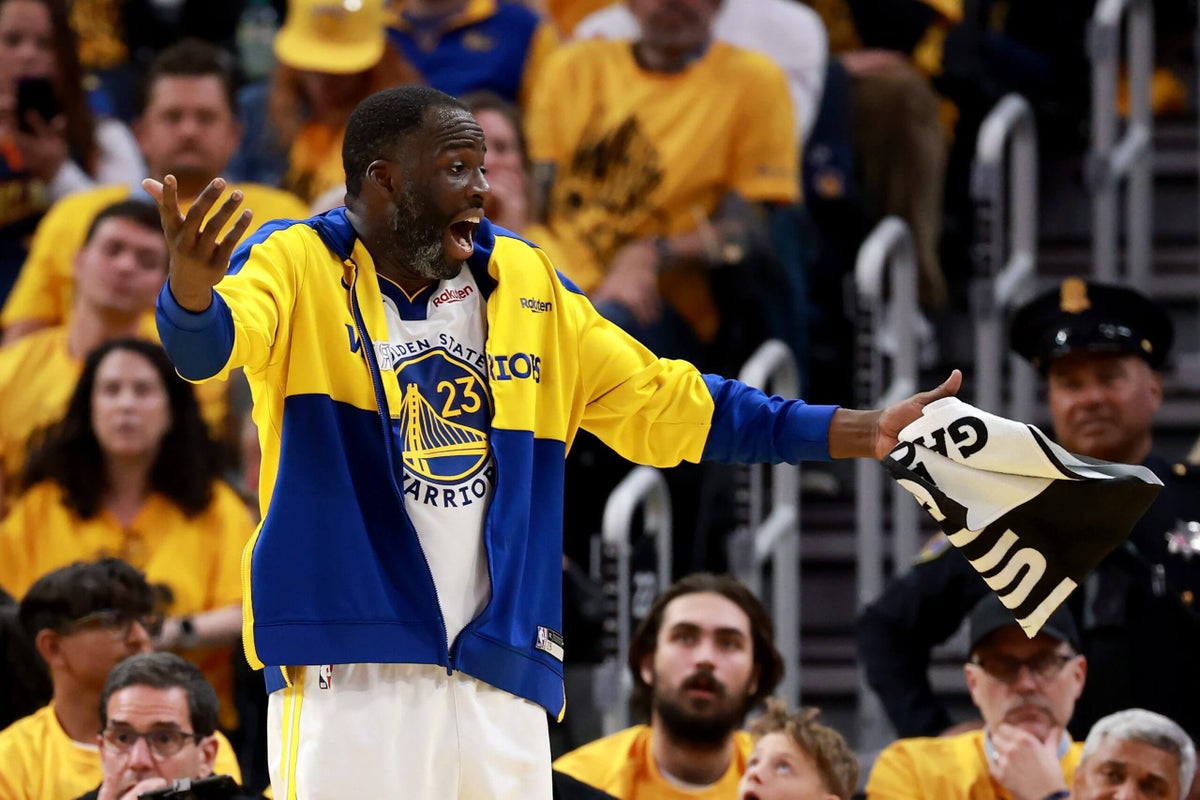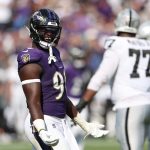

The stereotype of the “angry Black man” or “angry Black woman” is very real. On a daily basis, it follows us into boardrooms, classrooms and corporate offices. So when Draymond Green defended himself after his latest technical foul by saying he’s tired of the “agenda to try to keep making me look like an angry Black man,” it really bothered me.
Advertisement
Not because the stereotype doesn’t exist, but because he missed the point.
Green’s brief exchange with reporters after the Warriors’ loss, in which he received his fifth technical foul of the playoffs, included no acknowledgment of personal responsibility. Over the course of his career, Green has accumulated more than 200 technical fouls and has been suspended six times, once for putting Rudy Gobert in a headlock, another for hitting LeBron James in the groin during the 2016 NBA Finals and again for stomping on Domantas Sabonis’ chest during the 2023 playoffs.
Years ago, Green took a break from the team to “work on” himself after he was indefinitely suspended for the season after he struck Jusuf Nurkic in the head. He missed 16 regular season games. If that time taught him anything, it’s hard to tell. His words and, more importantly, some of his actions on the court continue to tell a different story.
I’ve worked in corporate America for over 18 years, including many as a manager. As a Black man, the majority of my managers and direct reports have been White men and women. In both cases, I’ve had to learn — sometimes the hard way — how exhausting and real the “angry Black man” stereotype can be.
I’ve watched White managers yell, lose control, act unprofessionally, and face little to no consequence. Among my Black co-workers, we’d often share the quiet truth we all know: “If we did that, we’d be out the door.” We’d share it almost laughing, because we knew there’s no world where we could act that way and not have every single stereotype plastered onto us, along with a possible pink slip.
I remember the only job I ever quit was over a decade ago. I knew I wasn’t going to receive the promotion I believed I had earned, and I’d made peace with that. I even started saving money in preparation. During my review meeting, after hearing all the pluses and minuses of my performance, I calmly said:
“I appreciate you taking the time to build this out. I’ve thought long and hard about this. I’m going to move on, but I’m thankful for everything you’ve done for me.”
Advertisement
That was it. A respectful exit. A few hours later, my phone lit up with calls from co-workers saying they’d heard I’d “exploded,” that I was “very upset,” that I had “raised my voice.” None of that was true. But somehow, my quiet, clear decision to leave was twisted into something angry and volatile. The manager in the room was White. So was my co-manager. I didn’t expect that reaction from them, but I also wasn’t surprised.
I remember one of the first times I got pulled over — it was with a group of my Black and Latino friends — and the cop patted me down and said, “Just give me the weed or the drugs, man.” We were pulled over because we resembled the description of a suspicious car with multiple people in it. I was so upset. They quickly let us go after making us exit and patting us down. But even in that moment, I knew any show of anger could likely have ended up with me on the news, with my name and life being mentioned in the past tense.
I know friends who tell me how straight they sit up, how they put their hands on the steering wheel, how they simply look ahead — almost like a robot — to avoid scaring a police officer when they pull up. Because we know any little thing is going to be viewed as a sign of disrespect, and we’ve seen countless examples of the amount of leeway a Black person gets.
The “angry Black man/woman” tightrope is one we walk every day. We live in a world where our emotions are constantly viewed through a distorted, racialized lens.
Green has to walk that rope too — but not in the same way. So much that comes with being a rich athlete protects him on a daily basis. Many of us don’t have the privilege of going home to gated communities, working under strong unions like the NBPA, or being protected by ironclad contracts like NBA players. We can’t speak freely on camera without risking serious consequences; and while NBA players may face fines, there’s a significant difference between being fined and being fired. A decade-old tweet from an NBA player might spark controversy, but a similar one from an everyday person could cost us our careers.
Advertisement
For the rest of us, being perceived as threatening — even when we aren’t — can change everything. When Green uses “the angry Black man” stereotype to explain the consequences of actions he predominantly instigates, he’s not raising awareness of a stereotype that too many casually joke about without ever taking seriously. It’s a reality we all face daily and even if Draymond instigates many of these events he’s also likely been worn down (which he likely has) by years of being called a “thug” or “violent.” Both things can be true.
Green isn’t being labeled an angry Black man because he’s passionate or expressive — though I’m sure some people view him that way. He’s being criticized because he keeps crossing the line. When he commits reckless fouls, derails his team’s momentum, or racks up suspensions, it’s not about race — it’s about accountability. It’s about how his actions affect his team and how they reflect on him.
There have been countless moments where I’ve stayed quiet through microaggressions and coded language — not because I didn’t have the words to respond, but because I knew that saying anything might label me as “difficult” or “hostile.” That kind of self-monitoring, that constant emotional restraint, is a toll that many people simply don’t understand because they’ve never had to live it. Being the enforcer and tough guy on the Warriors is a role Green shouldn’t abandon. It’s actually a part of the game that many who loved the NBA from a couple decades ago miss during this more free-flowing era. But when Green repeatedly crosses the line, it not only turns off fans from his playing style, but also from his refusal to take accountability for his actions.
Being Black and angry shouldn’t be a crime. It should just be human. We get angry like everyone else. But we don’t have as many get-out-of-jail free cards and we don’t get the benefit of the full array and range of human emotion.
One dynamic that Draymond deals with that the rest of us don’t is the role race plays in how Black athletes are covered in the media. Consider some numbers from a 2021 report from The Institute for Diversity and Ethics in Sport (TIDES) on newsroom diversity:
- 79.2 percent of sports editors were White and 83.3 percent were men.
- 72.0 percent of assistant sports editors were White and 75.8 percent were men.
- 77.1 percent of columnists were White; 82.2 percent were men.
Like many other industries, the sports world has failed in covering athletes of color and adding people of color to the press corps. How many Black reporters are in NBA and NFL locker rooms consistently? How many Latino reporters are in MLB locker rooms? Not many. More than before, but surely not what it should be.
So while I may disagree with Draymond’s usage, I also don’t understand what it is to be a Black athlete in a predominantly Black sport where the people covering you often don’t look like you. I’m sure that takes its own brand of mental gymnastics for any Black person, and exhausting is one of the words that immediately comes to mind. I also don’t know how much of what he said was influenced by the interaction he had with a fan who disrespected him and called him a ‘monkey’ at the game. When he shared his feelings at the end of the game, it could have been highly influenced by that interaction. Black players are not only covered predominantly by Whites but they also play sports in front of them as well.
Advertisement
And, to be clear, this is not about conforming to White standards of behavior. Most newsrooms are White. Most athletes — outside of the NHL — are people of color. What’s celebrated as exciting or fiery for Conor McGregor, Johnny Manziel or Baker Mayfield is labeled as arrogant or out of control for Shedeur Sanders, Barry Bonds or even Muhammad Ali.
The double standards are real. The bias is real. But accountability matters, too. And invoking a real stereotype to excuse behavior cheapens the experience for those of us who must carry that stereotype with us every day, in spaces that won’t give us the benefit of the doubt.
And while Green is using it to explain away bad nights on the court, the rest of us are busy living with it every single day – with no way of ever getting rid of it.
(Photo: Ezra Shaw / Getty Images)
This news was originally published on this post .









Be the first to leave a comment